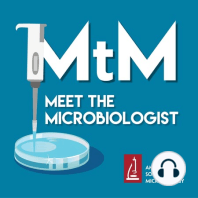19 min listen

074: Treating Ebola in America and Fecal Transfers with Colleen Kraft
074: Treating Ebola in America and Fecal Transfers with Colleen Kraft
ratings:
Length:
49 minutes
Released:
Jan 19, 2018
Format:
Podcast episode
Description
Colleen Kraft talks about treating Americans who became sick with Ebola during the west African outbreak and were evacuated to her hospital for treatment. In the second half, Kraft talks about her experience performing fecal transfers, and explains why she sees the gut microflora like a garden. Host: Julie Wolf Subscribe (free) on iPhone, Android, RSS, or by email. You can also listen on your mobile device with the ASM Podcast app. Julie's biggest takeaways: The patient conditions couldn’t be more different between the Liberian care centers and Emory University. The nursing ratio, access to both basic and experimental medicines, and even environmental conditions such as air conditioning created drastically different healthcare experiences between the two. While Ebola is a deadly disease, the symptoms such as headache, fever, and diarrhea are much more common than the bloody hemorrhaging often described. Patients can lose up to 10 liters of fluid each day! Fecal microbiota transfer is a more appropriate name than transplant; new microbes overlaid on top of the dysbiotic flora will reshape the microbiota already present. While FMT is currently used only to treat C. difficile (aka C. diff), forthcoming studies will determine if FMT can decrease risk of an antibiotic-resistant infection by displacing resistant bacteria. Featured Quotes(in order of appearance) “Ebola virus disease is much more mundane than all of the novels you might read. It’s really a sepsis syndrome with a spectrum of that sepsis. Part of sepsis can be abnormal coagulation factors and low platelets, and so those bleeding complications go along with that sepsis syndrome.” “It sounds really mundane, but supportive care is really the most important thing for these patients. When that can occur, people can recover.” “The body doesn’t really like Ebola. One patient was encephalopathic, had kidney failure, liver failure, had some bleeding. Once the viral load was gone, all those things uprighted! It was like a capsized ship that uprighted.” “I really view our guts like gardens. There are good fruits and vegetables when our gardens are in homeostasis. Once we use antibiotics, it kills the good fruits and vegetables of the garden and C. diff grows up like a weed. All we’re doing [when we treat C. diff] is giving weed killer but we’re not replanting that garden.” “I’m somebody who thinks after every antibiotic treatment for anything that we do, we should be giving people some sort of item to enrich or restore their microbiome.” “The most exciting thing I can think of is to bring cutting-edge research and contributing to people being cured by these methods.” Links for this episode Colleen Kraft Emory website And the Band played on Virus Hunters of the CDC The Hot Zone NETEC Clinical Virology Symposium Send your stories about our guests and/or your comments to jwolf@asmusa.org.
Released:
Jan 19, 2018
Format:
Podcast episode
Titles in the series (100)
MTS24 - Jeff Bender - MRSA in Animals: Jeff Bender is a professor of veterinary public health at the University of Minnesota, and his research interests lie in the intersection of animal health and human health, including animal-borne diseases of humans, food safety, and antibiotic resistant p by Meet the Microbiologist